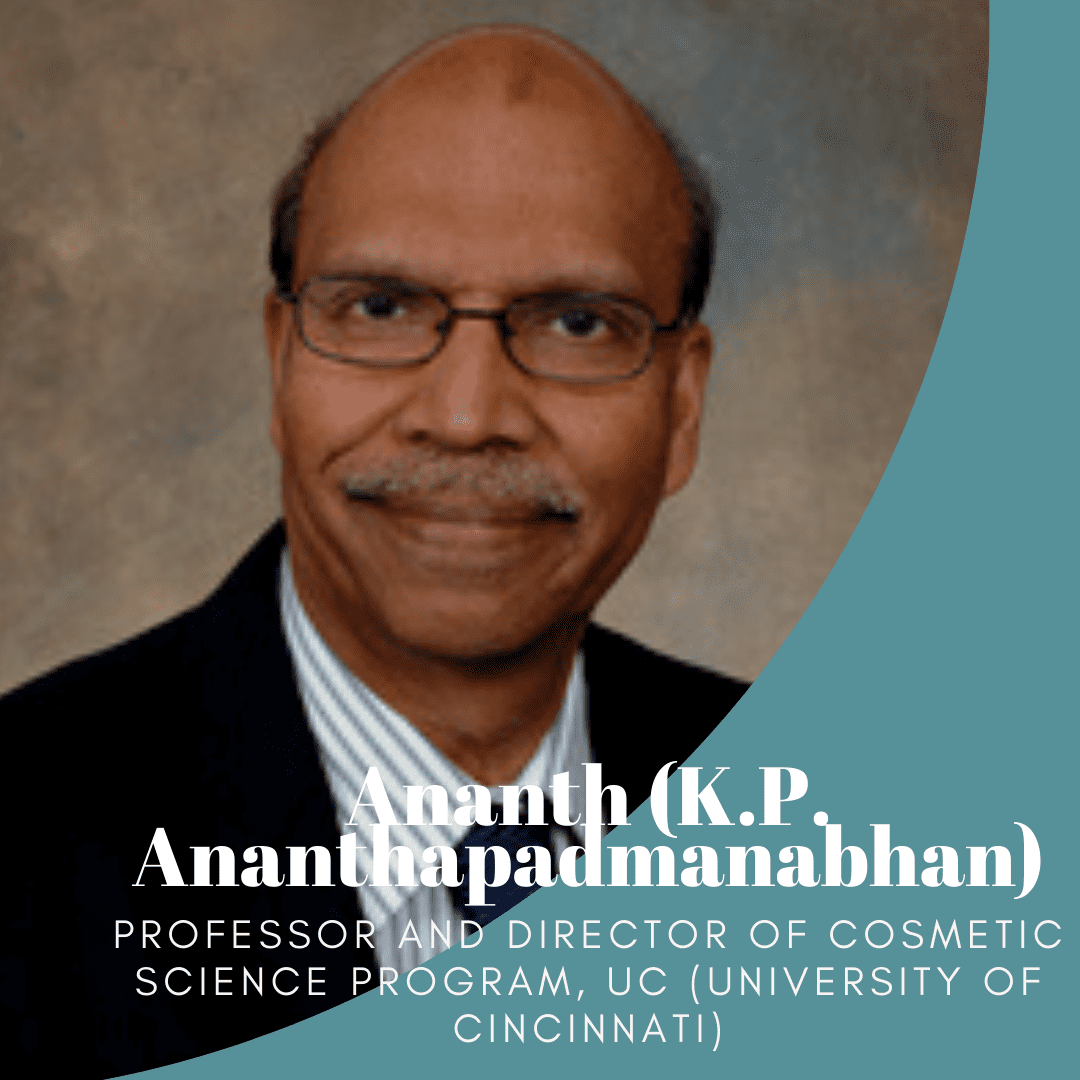
We talked with Ananth (K.P. Ananthapadmanabhan), Professor and Director of Cosmetic Science Program, UC (University of Cincinnati) about the opportunities to advance career with study Cosmetic Science with the Online Program from the UC in Cosmetic Science
EURO COSMETICS: The University of Cincinnati is one of the first institutions to offer online courses. The graduate-level MS in Cosmetic Science program from the James L. Winkle College of Pharmacy is the oldest and only asynchronous cosmetic science program available.
Which degrees are awarded?
K.P. Ananth: We offer a graduate certificate (GC) and a MS degree in cosmetic science in our online programs. One can participate in our program as a full time online student or as a part-time online student. We are also piloting a new industrial PhD program in cosmetic science in which the experimental part of the PhD can be carried out in a sponsoring industrial R & D organization. These are, in addition, to our conventional on-site MS/PhD programs.
EURO COSMETICS: What are the advantages of asynchronous instruction?
K.P. Ananth: Our program is a global program in the sense that we have students from all over the world with students coming from very different time zones. The asynchronous nature of our program makes it easier for everyone to participate in our program on his or her schedule. Furthermore, this allows students to learn at their own pace.
Even though our program is asynchronous, we offer weekly special discussion hours in our key courses for face-to-face contact and interactions. We also adjust our timing for courses such as journal club to accommodate live participation of students from different time zones.
EURO COSMETICS: For whom is the online program suitable? Can you make recommendations here?
K.P. Ananth: The University of Cincinnati Online provides a world-class educational experience that provides flexibility for busy professionals, lifelong learners, and students from around the world. All of UC Online’s programs are led by industry-recognized faculty and combine innovation with freedom of intellectual inquiry to create an inclusive environment tailored to UC Online students’ needs. Learn more at https://online.uc.edu/.
Our on-line program in cosmetic science is suitable for those who are already working and want to move up in their organizations and in their careers. It is also good for fresh graduates in chemistry, biology, chemical engineering etc. who want to continue their education while looking for jobs. They can continue even after they take up a job as this can be done either as a part-time or full time student. This is also ideal for those who want switch fields and enter the cosmetic and personal care area. Entrepreneurs who would like to start their own business or have started their business, but want to learn more about formulation science, cosmetic regulations, safety and efficacy will also benefit immensely from our program.
EURO COSMETICS: What specialized knowledge do the students gain?
K.P. Ananth: Students learn about all aspects of cosmetic and personal care product science starting from consumer understanding to formulation science, skincare and haircare science, productsubstrate interactions, color cosmetics, fragrance science, safety, cosmetic regulations, microbiology, cosmetic pharmacology, biostatistics and clinical and instrumental methods. We also offer a one week-intensive cosmetic science lab during summer months where the students practice making emulsions, creams, lotions, body wash, deodorants etc. Students also become familiar with skin measurements such as transepidermal water loss, pH, elasticity, hydration and color.
As part of their MS degree, students are expected to complete a capstone project on a relevant topic by a critical review of the literature, an assessment of the state of that art and making conclusions and recommendations on future directions. In selected cases, the MS thesis also involved experimental work at the R & D facilities of a sponsoring organization. A mentor and two other committee members guide the students during the capstone process.
EURO COSMETICS: How long does it generally take to earn a degree?
K.P. Ananth: Part time students can finish their GC in one year and MS in about 2 1/2 to 3 years. Full time students can finish their degree sooner. The advantage of the program is that the students can learn at their pace and complete their degree.
EURO COSMETICS: How are students supported during instruction?
K.P. Ananth: There is no financial assistance for our program. Fortunately, most of our students are supported by their employers.
Those who are doing their MS degree from the US may be eligible for federal educational loans.
EURO COSMETICS: And how does communication with students work?
K.P. Ananth: All lectures are available online through our network system. We use programs such as WebEx and Microsoft Teams for our regular meetings, weekly discussions and journal club. We use emails and other web-based communication methods for individual/group discussions. Our in-person online journal club has been very successful with students participating in active discussions.
We are continually exploring all the newer methods for improving our communication with students.
EURO COSMETICS: What tools and assistance do you offer students so they can gauge what they have learned?
K.P. Ananth: We have regular exams and homework to ensure that the concepts taught in the class are fully grasped by the students.
Several of our courses have special projects and in some cases, group projects, so that they can interact and learn from each other.
Our journal club and capstone projects have been excellent training grounds for critical analysis of literature and integration of the information to arrive at conclusions and recommendations for future work in their areas of choice. In our cosmetic science lab, students work in groups and on the last day, they are asked to create a product of their choice based on their lab learnings.
We provide IT help for all our students so that they can access and manage IT issues during course of their study.
EURO COSMETICS: How do you provide the students with orientation so that they can learn by themselves?
K.P. Ananth: UC online is our dedicated group of people involved in the admissions process, onboarding registration and orientation for all new students. We have now started a meet and greet session on WebEx for all our new recruits. We have an experienced faculty who will work with the new students to develop a plan of study that will guide the students with their entire plan for their certificate/degree.
EURO COSMETICS: What are the challenges facing the cosmetic industry in the coming years? And how can universities help?
K.P. Ananth: The cosmetic industry is an ever-evolving field that is becoming increasingly science driven in its product technology and consumer communication. Consumer awareness of ingredients and the science underpinning the technologies have increased significantly over the past decade and the social media has played a key role in this process. Consumer interest in naturals and sustainable ingredients has grown tremendously. The industry focus also has shifted more towards “care” rather than superficial cosmetics.
With changes in global demographics, about a billion people are going to be over 65 years old soon and very little work has been done to understand their skincare and other personal care requirements. Another area of increasing importance is the
sensitive skin with more and more consumers claiming to have sensitive skin while our understanding of the factors leading to sensitive skin remains rather limited.
Changes in regulations and consumer trends are also having an impact on the cosmetic industry. The micro-plastics ban in rinse off products has led to several natural alternatives. Products claiming free of ingredients X, Y and Z have increased with sulfate-free and PABA-free as a couple of examples. With the anticipated changes in sunscreen regulations, organic sun-screen-free UV protection type claims have begun to appear in the marketplace.
With changes in CBD oil regulation, there has been an explosion of activity in this area.
Rapid developments in areas such as genomics, skin microbiome and in-vivo imaging measurements are giving rise to novel technologies and claims.
All the above factors are indeed setting the technical direction for the cosmetic industry. Such changes will lead to an increase in the demand for well-trained scientists and engineers for the industry.
Next generation scientists and engineers will need more specific training in cosmetic science than that from the traditional training in chemistry, chemical engineering and biology. Typically, a personal care R & D operation may spend as much as a year in training new recruits. This is where universities can make a difference with specialized training in cosmetic science.
EURO COSMETICS: Thank you for the conversation.




